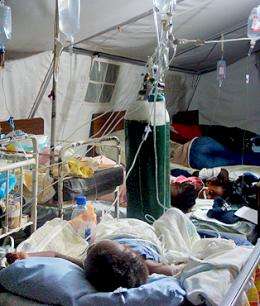Haiti's Most Vulnerable Children at Heightened Risk in Earthquake's Aftermath

(PhysOrg.com) -- As Haiti rebuilds from the devastation of January's earthquake, a Yale study finds that the country's most vulnerable children will likely face unique and additional risks in the forms of gender-based violence against women, child trafficking and poor psychosocial health. The findings appear in the Aug. 3 issue of the Canadian Medical Association Journal.
Jhumka Gupta, assistant professor at Yale School of Public Health, and co-author Alpna Agrawal, a post-doctoral fellow at Yale Center for Interdisciplinary Research on AIDS, contend that the physical devastation, widespread displacement and loss of life from the earthquake, coupled with the high rates of poverty and gender-based violence against women that existed pre-disaster, will further compromise children’s health and safety.
The authors analyzed pre-earthquake data from nearly 8,000 Haitian households (where 22,495 children resided) and found that 32 percent of these children met UNICEF’s criteria of being an orphaned or vulnerable child. As many as half of these children (51.4 percent of girls and 48.6 percent of boys) lived in homes where men perpetrated sexual or physical violence against their females partners. These children, particularly girls, were also more likely to live in homes with adults with HIV.
"As international aid continues to pour into the Caribbean country, it is important that a holistic approach be developed to promote the safety and well-being of Haiti’s children," said Gupta. Along with reunification of children with family members, it is also critical to ensure children’s safety within their own homes. “The alarmingly high prevalence of violence against women occurring in households is inextricably linked with dire child health consequences, including poor mental health, respiratory illness and child abuse,” she said.
In order to keep families intact and protect children, Gupta said it is important to continually provide health care to HIV-positive caregivers to reduce the likelihood of abandonment or neglect. “Child traffickers tend to manipulate unstable situations, such as household violence and sick family members, to lure young girls into sexually exploitative situations, thus increasing their vulnerability to HIV/AIDS and unwanted pregnancy,” she said.
Rebuilding efforts need to prioritize reducing gender-based violence against women by giving women and children a voice in rebuilding efforts, bolstering legal protection of women and children, integrating support gender-based violence victims into healthcare settings, and conducting outreach to boys and men to reduce their use of violence against women.“Unfortunately, issues such as gender-based violence against women are often under-emphasized in rebuilding efforts. The stakes are too high for Haiti's children, and this paradigm must change," Gupta concluded.















